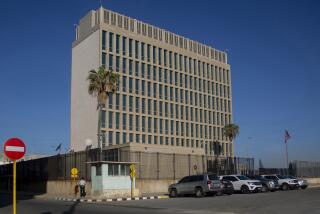Study on Gulf War Illnesses Is Disputed : Health: Medical experts say the Pentagon didn’t sufficiently buttress with facts its assessment that no such syndrome exists among veterans.
- Share via
WASHINGTON — A Defense Department study did not adequately support with facts its conclusions that no unique illness or syndrome exists among Persian Gulf War veterans, a committee of medical experts said Monday.
The committee of the Institute of Medicine, which is part of the National Academy of Sciences and which analyzed the study at the Pentagon’s request, said the reasoning in the study was “not well-explained” and recommended that the department “either be more cautious in making this conclusion, or justify it better.”
The Pentagon said this month that a study of more than 10,000 veterans of Operation Desert Storm in 1991 found no evidence of any new or unusual “Gulf War disease,” despite thousands of complaints from servicemen and women.
Many have reported symptoms of fatigue, joint pain, headaches, sleep disturbances, depression and other ailments, including the belief that symptoms have been transmitted to spouses and subsequently offspring.
“If indeed there were a new, unique Persian Gulf-related illness that could cause serious disability in a high proportion of veterans at risk, it would probably be detectable in a population of 10,020 patients,” the committee said. “On the other hand, if the illness were either mild or only affected a small proportion of veterans at risk, it might not be detectable in a case series, no matter how large.”
The institute said it was “likely that at least a few . . . patients have developed illnesses that are directly related to the Persian Gulf service,” among them infectious diseases that are rare outside the Middle East and psychological stress that may have exacerbated physical or mental illnesses.
The assessment by the Pentagon did not mention those illnesses. The committee “considers this to be a serious omission,” its report said.
The Defense Department study also erred by emphasizing environmental factors, such as chemical or biological agents, the report said.
Instead, examples of “psychological stressors should be used to supplement the discussion,” the report released Monday said. Persian Gulf veterans, the Pentagon, the Department of Veterans Affairs and the public “need to understand that such stressors produce adverse psychological and physical effects that are as real and as potentially devastating as chemical or biological stressors. Furthermore, proper recognition of such effects may lead to appropriate and successful treatment.”
The institute released its findings as a White House advisory panel created by President Clinton to study the problem convened its first meeting.
In remarks to the panel Monday, First Lady Hillary Rodham Clinton said: “None of us knows what the research now being conducted or called for in the future will tell us. So far, the research that the government has conducted indicates that thousands of veterans who were healthy when they left for the Gulf War are now ill.”
Many veterans believe that these symptoms cluster together into a Gulf War syndrome that is unique, she said. “Based on the research to date, however, experts have concluded that there is not enough evidence to call this a syndrome. This is an issue that will continue to be studied as more research is completed. There are disagreements about the likely causes and the best treatments for these symptoms.
“These issues also will continue to be studied as more research is completed,” she said. “These are complicated scientific questions that deserve careful scientific scrutiny.”
The Institute of Medicine said the Pentagon report “reveals problems in the interpretation of some of the data.”
For example, the Pentagon study needs to clarify health comparisons made between personnel who served in the Persian Gulf and health studies of other populations and between military personnel who did and did not serve in the war, the institute said.
More to Read
Sign up for Essential California
The most important California stories and recommendations in your inbox every morning.
You may occasionally receive promotional content from the Los Angeles Times.













